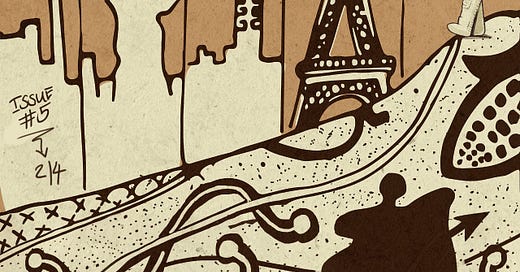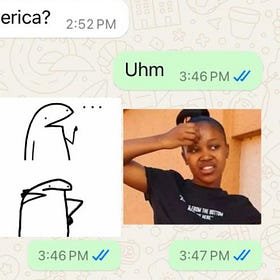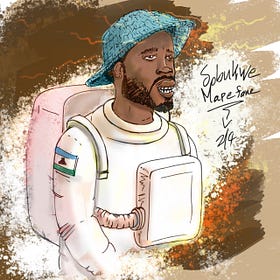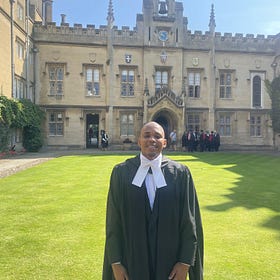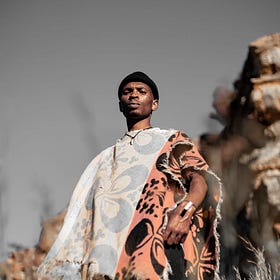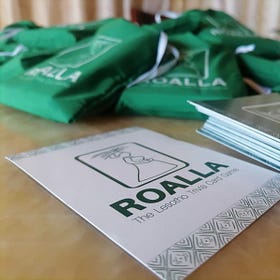What’s Inside 👀
“Amerika Ho Joang?”
Arti Corner, Episode 2 - Interview with Sobukwe
Basotho Students Abroad: Celebrating the Class of 2024.
Sounds of Home: "Ke lia-thoteng li bapile" - Thabo Marebole on the Artful Fusion of Poetry and Music.
Roalla le sa Sele: a Trivia Card Game about Lesotho.
26 Tidbits about Moshoeshoe I and Lesothosaurus
From the Editorial Desk 🖥️✍🏿
Helele, Basotho ba batle!
Esale re nyamela empa re khutla ka matjato ho le lakaletsa mahlohonolo a selemo se secha!
The theme for this (birthday- we are turning one) edition is “Mosotho Whereva.” As a newsletter for Basotho in the diaspora, we think a lot about what it means to be a Mosotho wherever you are. We hope this theme offers you two thoughts.
One, Basotho are everywhere. Because we’re a relatively small country with a small diaspora, our footprints may not be visible but Basotho are always travelling and moving to different parts of the world. Colombia, Vietnam, Kenya, Canada, Ghana, China, Algeria — you name it, and there are Basotho there, making a life for themselves in all corners of the globe. We are a global people, in and of the world. We may not realize that other Basotho have been where we are, and where we want to go, so we offer this newsletter in hopes that it will help more of us connect.
Two, “Mosotho Whereva” shares our conviction that there is no “right” way to be a Mosotho, whether you’re in Lesotho or not. As Basotho living outside the country — especially those of us who are or have Third Culture kids — we’re often looking back to find a “real Lesotho” that we can remember and replicate in the name of “authentic culture.” The idea that there are quintessential, non-negotiable things that are “the real Lesotho” limits our capacity to imagine ourselves as a people with agency, shaping and reacting to the world around us. But culture is made, it is whatever we make of it. For as long as Basotho are alive, Basotho culture will be, too.
We must release romantic notions of what Sesotho is because even the historical record shows that the very Basotho we reference and revere as “prototypical” were themselves innovating, adapting and rehearsing their lives like we are. The Basotho of the 1800s adopted different religious systems, learned to make do with new clothes, adopted different cuisines, met different people and they themselves migrated. Much more than The Blanket — which, if we’re being pedantic, originates in Europe and is manufactured outside Lesotho — we are a people of movers and shakers, constantly reacting to and making the world around us. If there’s anything that defines us, perhaps it is that.
If we remember our foremothers in just one way, we forget that they were agents of history, not just people that it happened to. Imagine if there had been debates about whether Moshoeshoe should introduce matsema because “it’s not our culture.” Now, of course, these things are far more complex than I’m making them sound. There are historical forces (including colonization, Christianization, globalization) that have made this question of “who is a Mosotho” more urgent.
There’s also a challenge to allow indigenous languages to flourish, especially in Lesotho where not knowing Sesotho is a marker of upward mobility and class ascension. The heart of “Mosotho Whereva” is this: you don’t have to be anything other than who you are, wherever you are. The “real” Mosotho is the one who is. We hope this thought gives you freedom to claim your Bosotho wherever you are.
Ba tsena,
Nthatisi Bulane, Lerato Mensah-Aborampah, Lehlohonolo Tefo Tlhaole, ‘Matlhabeli Molaoli, Makhethe Vuma, le Boemo Khabo.
"Amerika Ho Joang?"
I have a hard time answering that question; yet, it is one I get consistently every time I’m home. For a few years after I left home, I’d fumble through a series of quiet chuckles and uhms, hoping that the conversation moved to something else before people realized I had said nothing. Then I resorted to my go-to: “mhk, ho bata hampe hle! Ke mahloa feela”. Still, it didn’t feel like a satisfying answer. What do people really want to know when they ask that?
Arti Corner by ArtiTefo, Episode 2 - Interview with Sobukwe Mapefane.
Welcome to the second episode of Arti Corner!
This is an insightful conversation with a fellow Mosotho, a multidisciplinary artist and fine art photographer Sobukwe Mapefane. This conversation occurs a couple of months after his return to Lesotho from an artist residency in Germany as part of the Leipzig International Art Programme.
Basotho Students Abroad: Celebrating the Class of 2024.
Nothing warms our hearts like seeing Basotho flourish wherever they are in the world!
We want to take the time to celebrate some Basotho students who just completed academic milestones this year, in different parts of the world! This list is not exhaustive, by no means. Le bangata mme rea le tlotla kaofela! Pursuing a degree while also navigating the highs and the lows of being in a new country is no small feat, we know.
"Ke lia-thoteng li bapile" - Thabo Marebole on the Artful Fusion of Poetry and Music.
This third instalment of the Sounds of Home series features Poet and Storyteller, Thabo Marebole, known amongst many as Mora-Mobu.
Music is deeply woven into his relationship with poetry and you will learn in this interview that both artforms trace all the way back to his childhood — a testament to the commitment and passion he has poured into his craft over the years.
Roalla le sa Sele: a Trivia Card Game about Lesotho.
There’s a new trivia card game in town! Roalla ke papali e ncha cha! cha! e entsoeng Lesotho.

